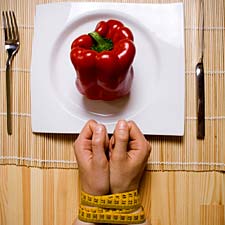10 reasons why your effort isn’t working
So, you’ve made some changes within the past few months to your meal plan, training routine and sleeping patterns but you haven’t seen that darn scale pointing to the low numbers that you were hoping for! In fact, your pants seem to be tighter and your shoes are now too tight. What the heck is happening? How did my feet get fat too, you question as you struggle to comprehend the “awful” situation at hand. Frustration doesn’t come close to how you are feeling. In fact, you may be to the point where your brain is providing you with rational reasons why you should just give-up and surrender to the fact that you may NEVER lose the weight! After all, it’s hereditary! My grandmother is over-weight, my father and sisters are all heavy, and they don’t seem to mind, you logically reason as your deflated body slumps into a chair.
Ok, already! Are you willing to table the self-defeating inner dialogue long enough to learn what may REALLY be the problem? What if I told you that these may all be signs that you are on the right track to long-term, sustainable weight-loss? And yes, even the feelings of frustration are indicators that you are on you way to changing. What you may need, however, are some modifications to your plan. Here are the top ten reasons why you may not be seeing results.
The Number one Reason:
You’re not really doing the work.
Ouch! Yes, I’m sorry! We all have good intentions with cleaver minds that play games with our perceptions. It may appear as if you are doing the work but how can we be sure? First, I want to make it clear that you “shouldn’t” be suffering, struggling, or depriving yourself. Research has demonstrated that these methods don’t work for long-term sustainable results. With that being said, have you noticed if you are giving yourself an “out” to completing the whole work out circuit more than once a week? Are you ‘lapsing” in your care for choosing healthier food options more often than when you began your plan? Have you been coping-out of completing the entire walk by taking a short-cut? Do you give yourself the ok to ease up because you’ve been working so hard and you deserve a break? These lapses in behavior are brief episodes that can temporarily thwart your nourishing habits and over-time may turn into a relapse; a firm return to the unhealthy habit. One way to combat a lapse is to keep a journal. Writing the thoughts and feelings related to your lapse will help to battle absolute thinking patterns such as “I’ve done this for years, I can’t change my habit.”
[I don’t have enough room here to tell you now, but I have a sure fire way to help you change this type of thinking with 3 easy and painless steps that will allow you to feel instantly at ease! And, you won’t have to keep a journal or suffer restrictive dieting methods.]
2. You’re not really eating right.
“Does a chocolate oatmeal cookie count as a healthy food option?” One client recently asked. With manufacturer’s confusing nutritional labeling, there’s no wonder why so many of us don’t understand what is and isn’t a healthy choice. Additionally, we are bombarded with advertisements and popular magazines that only add to the confusion when their main goal is to sell products not health. In fact, many leading healthy foods are making you fat!
3. You’re not eating the adequate food combinations
What the heck do dieticians mean when they tell us to eat a preferable meal and why is this so important? It all breaks down to having “balanced” nutrient levels which include water, carbohydrates, lipids(fat), proteins, minerals and vitamins. Keeping your leptin and insulin levels balanced is the easy way to maintain or lose weight. Therefore, it’s the specific combination of these six major nutrients that assist in keeping our glucose levels balanced helping us to feel satisfied and energized. What are they?
4. You’re not drinking sufficient water
If there is a magic pill to weight loss, then I’d have to say it’s water! Studies have produced varying recommendations over the years but in truth your water needs depend on many factors including your health, how active you are and where you live. Every day you lose water through your breath, perspiration, urine and bowel movements. For your body to function properly, you must replenish its water supply by consuming beverages and foods that contain water. So how much water does the average healthy adult living in a temperate climate need? In general, doctors recommend 8 to 9 cups (Mayoclinic.com).
5. You’re not really exercising
All the hype on television and the internet about miracle working-out programs and quick fixes is hard to resist. On some late night ads, we often hear and see many drastic transformations. Our ears lift as we hear how someone dropped 8 dress sizes in only 14 days! Dropping 20lbs of body fat is going to take a lot longer than 2 weeks and depending on the individual, it could take up to 20 weeks. Ughhh! The good news is that I’ve designed a teleseminar that goes much deeper than putting a list of foods together that you will not sustain! I already know this, because I’ve been doing this for a long time! I see people needlessly struggling to lose weight… why, because many people just don’t believe that any of this is possible without struggling and suffering through diets and sweating through long hours of exercise… EVERYDAY! The only catch? You really need to do the work to participate in the group call (otherwise it’s not much of an accountability program, is it?). Check out the link at the bottom of this article.
6. You’re over exercising
Walking at an incline for 1 hour is not magically going to burn hundreds of more calories than walking a similar pace on a flat surface. One thing we must realize is that our rate of perceived exertion doesn’t always represent with how many calories we’ve burned. It’s also been noted through several research studies that simply moving more in the form of chores, errands and other random movement will increase daily burn substantially. I’d say the number one reason people fail in this area is by “rewarding” themselves after a training they perceived as being very intense with an extra large M&M Blizzard from the local Dairy Queen or a Frappy from Starbucks!
7. You’re not getting ample rest
It’s not so much that if you sleep, you will lose weight, but if you are sleep-deprived, meaning that you are not getting enough minutes of sleep or good quality sleep, your metabolism will not function properly,” explains Michael Breus, PhD, author of Beauty Sleep. On average, we need about 7.5 hours of quality sleep per night, he says. “If you are getting this already, another half hour will not help you lose 10 pounds, but if you are a five-hour sleeper and start to sleep for seven hours a night, you will start dropping weight.” Exactly how lack of sleep affects our ability to lose weight has a lot to do with our nightly hormones, explains Breus. The two hormones that are key in this process are ghrelin and leptin. “Ghrelin is the ‘go’ hormone that tells you when to eat, and when you are sleep-deprived, you have more ghrelin,” Breus says. “Leptin is the hormone that tells you to stop eating, and when you are sleep deprived, you have less leptin.” More ghrelin plus less leptin equals weight gain.
8. You’re juggling too much at once
Many people see a diet as an excuse to overhaul their lifestyle completely, which is not practical. Some rule out their favourite foods altogether, such as chocolate, or suggest they will never visit a pub again in the hope they won’t fancy a glass of wine. The best way forward is to find a plan that fits in with your lifestyle. Allow yourself a little of what you fancy and don’t give up if you fall off the (station)wagon..or better the radioflyer!
9. Your goals are not wise and sustainable
Most people trying to lose weight focus on just that one goal: weight loss. However, the most productive areas to focus on are the dietary and working-out adaptions that will lead to that long-term weight change. Effective goals are 1) specific; 2) attainable; and 3) forgiving (less than perfect). “Exercise more” is a commendable ideal, but it’s not specific. “Walk five miles everyday” is specific and measurable, but is it attainable if you ‘re just starting out?” Walk 30 minutes every day” is more attainable, but what happens if you’re held up at work one day and there’s a thunderstorm during your walking time another day? “Walk 30 minutes, five days each week when weather permits” is specific, attainable, and forgiving. In short, a great goal!
10. You’re not dealing with the stress in your life.
There are several ways in which stress can contribute to weight gain. One has to do with cortisol, a stress hormone. When we’re under stress, the fight or flight response is triggered in our bodies, leading to the release of various hormones. Whether we’re stressed because of constant, crazy demands at work or we’re really in danger, our bodies respond like we’re about to be harmed and need to fight for our lives (or run like heck). To answer this need, we experience a burst of energy, shifts in metabolism and blood flow, and other adaptions. If you remain in this state for a prolonged amount of time due to chronic stress, your health becomes at risk. Aside from a host of other dangers, chronic stress can also cause weight gain — which is why some products like Cortislim are marketed as diet aids. Chronic stress and cortisol can contribute to weight gain by: lowering your metabolism, increase cravings, blood sugars can alter and cause metabolic syndrome, you will store more fat, engage in emotional eating, and will eat more fast foods.
Denise Campbell is a Ph.D.(c) specializing in helping people break through the invisible forces of beliefs, behaviors and biology to lose weight and enjoy life without struggling or suffering. Listen to a FREE 90-minute audio for more helpful tips on how to use your biology to easily lose weight. For more information go to http://www.theinvisible-diet.com
Article Marketing Robot Rules!
-
Go From Fat to Sexy With These Six Secrets
Going from flabby, fat and frumpy to ton
-
5 Secrets Of Setting And Reaching Your Weight Loss Goals
Good intentions for weight loss are wonderful. Like a whole lot of
-
Top 3 Tips for a Healthy Breakfast
You wake up late, get ready for work in a hurry and rush out withou
-
Enhancing Male Bodies
The body is a critical link between hegemonic masculinity, male s
-
5 Ways To Make Sure Your Workout Is Helping You Lose Weight
Working out and building
-
Cheat Day With Your Exercise Program
Nobody likes to diet, so for those peopl
- DON'T MISS
- A Healthy Balanced Diet: Eating Healthy Fats Is Not Just Good For You But It Is A Requirement To Remain Living
- Here’s Why Your Diet Isn’t Working!
- Best Diet for Weight Loss -- One Size Fits All
- How Bad is Drinking Alchol When Trying to Lose Weight?
- What Are You Willing To Do To Achieve Your Weight Loss Goals
- Weight Loss Tips Intended For The Typical Man Or Woman
- Tips to Get Rid of Stubborn Belly Fat 朆urn Excess Pound from now
- Why Wishful Thinking Won't Help You Lose Weight
- Eat More Fiber, Lose More Weight
- 5 Reasons Everyone Should Try A Kettlebell Workout




